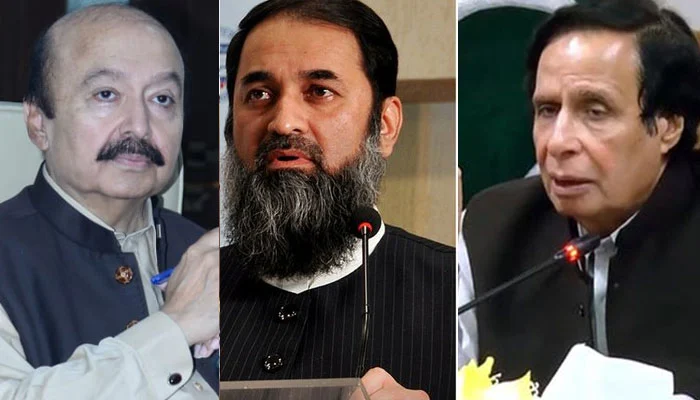LAHORE: The ongoing ‘constitutional feud’ between the federal and Punjab governments is likely to land in courts as some questions of law have arisen after Governor Balighur Rehman asked Chief Minister Pervez Elahi to seek a “vote of confidence” in a special assembly session.
The dispute over the previous runoff election of the chief minister was also settled by the courts after the Supreme Court observed in June that a ruling passed by the presiding officer (deputy speaker) regarding the rejection of 10 votes of the Pakistan Muslim League-Quaid (PML-Q), polled in favour of Elahi, was in violation of its judgement and Article 63-A of the Constitution.
Punjab has not seen political stability since the ouster of prime minister Imran Khan through a “vote of no confidence” in April and several petitions are still pending before the courts relating to the chief minister’s election.
If a media statement of Interior Minister Rana Sanaullah Khan is to be believed, the coalition government in the centre is mulling over the imposition of “governor rule” in Punjab since Chief Minister Elahi has not taken a vote of confidence, as asked by the governor.
A source in Pakistan Muslim League-Nawaz (PML-N) suggested that the governor, after denotifying the chief minister, could also ask him, under Article 133 of the Constitution, to continue to hold the office until the election of his successor.
Although the lawyers reached by Dawn for their comments differ on the governor’s orders issued to the chief minister, they are unanimous that a legal battle appears to be the only way forward for resolution of the current crisis in Punjab.
Shahzad Shaukat, a former advocate general of the province, believes that any party which feels aggrieved over the actions by the governor or the assembly Speaker is certainly going to knock at the door of the Lahore High Court as a first remedy.
He does not buy the Speaker’s argument that the governor cannot summon a fresh session when the house is already in session. He says the Constitution is superior to all the laws or rules in the country and it does not put such embargo on the governor.
Shaukat argued that the validity of ongoing sessions of the assembly summoned by the speaker can also be questioned since the session called by the governor, which was held in Aiwan-i-Iqbal, has not been prorogued.
However, Safdar Shaheen Pirzada, an advocate of the Supreme Court, disagrees and argues that clause 7 of Article 130 does not allow the governor to summon a fresh session when the house is in session.
He admitted that it is not a constitutional requirement that the speaker keep the house in session only to frustrate, on technical grounds, the governor’s directive to the chief minister to seek a vote of confidence.
According to Pirzada, the Punjab Assembly’s rules and the Constitution do not cater for a situation the province faces at present.
Misunderstanding
Talking to Geo News, retired Justice Shaiq Usmani said the Speaker had misunderstood the constitutional provisions while giving his ruling on the governor’s order.
He said Article 130 (7) says the governor can summon a session if he believes that the CM has lost majority in the house.
He argued that the Constitution has given powers to the governor to summon a session and ask the CM to show that he enjoys confidence of the house.
In reply to a question what would happen if the chief minister did not take a vote of confidence, he said the CM would cease to hold office and a new incumbent should be elected.
In another Geo News programme, a senior lawyer of the Supreme Court, Salman Akram Raja, said it is debatable that clause 7 of Article 130 says the governor shall summon the provincial assembly and require the chief minister to obtain a vote of confidence.
It means, he added, the present assembly is not in session and the governor has specially summoned the assembly for a vote of confidence. “And a new session could be called for this specific purpose.”
He said the rules of the Punjab Assembly, which speak about the vote of confidence, were made before the 18th Amendment. He believed confusion abounded and the speaker could explain through ruling whether he needs a new session for the vote of confidence or not, following the 18th Amendment.
Rule 22 of the Punjab Assembly (rules of procedure) says: “If, on the day fixed by the Governor for obtaining a vote of confidence from the Assembly under clause 7 of Article 130 of the Constitution, the Chief Minister refrains from doing so, it shall be deemed that he does not command the confidence of the majority of the members.”
In the same television program, a former president of the Supreme Court Bar Association, Hamid Khan, said when an assembly is already in session, the governor is unable to call a new sitting under Article 130.










